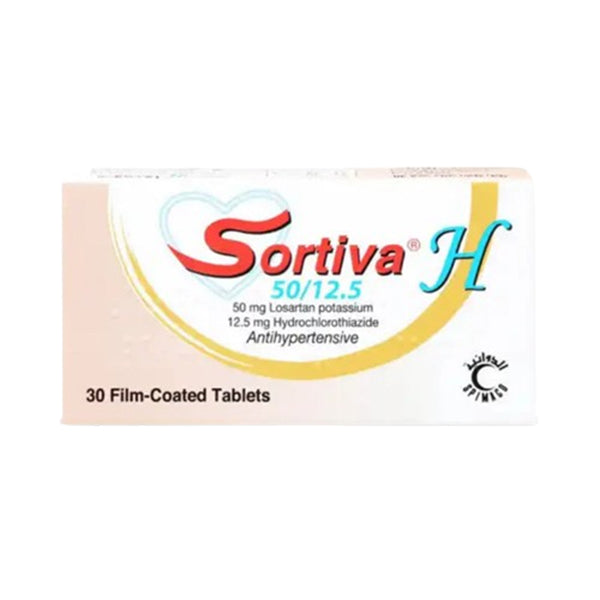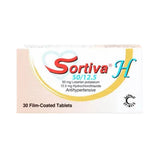Sortiva-H50/12.5 mg 30 tablets:
Sortiva-H 100/25 mg tablets belong to antihypertensive drugs.
How Sortiva-H Losartan/Hydrochlorothiazide works:
- Losartan is an angiotensin II receptor blocker (ARB) and works by blocking the effect of angiotensin II in the body, which causes blood vessel constriction.
- As a result, losartan relaxes blood vessels, lowering blood pressure and increasing the supply of blood and oxygen to the heart.
Uses of Sortiva-H50/12.5 mg:
- Treating hypertensive patients, adults, children and adolescents aged 6-18 years.
- Kidney protection in patients with type 2 diabetes who suffer from high blood pressure with laboratory evidence of impaired kidney function and excretion of protein in the urine at a rate of 0.5 grams per day (a condition in which the urine contains an abnormal amount of protein).
- Treating patients with chronic heart failure, when treatment with medicines called angiotensin-converting enzyme inhibitors (ACE inhibitors, medicines used to lower high blood pressure) is not appropriate.
- If your heart failure is controlled with an ACE inhibitor, you should not switch to losartan.
- Treating patients with high blood pressure and left ventricular hypertrophy, losartan has been shown to reduce the risk of stroke.
Do not use Sortiva-H50/12.5 mg:
- If you are allergic to losartan, hydrochlorothiazide, or any of the other ingredients of this drug.
- If you are allergic to other sulfonamide derivatives.
- If you suffer from severe liver dysfunction.
- If you have low potassium, sodium or high calcium levels that cannot be corrected by treatment.
- If you are pregnant for more than 3 months.
- If you have very poor kidney function or if they are not producing any urine.
- If you have diabetes or kidney dysfunction and are being treated with a blood pressure lowering medicine containing aliskiren.
How to use Sortiva-H50/12.5 mg:
- The tablets should be swallowed whole with a glass of water.
- You should try to take your daily dose at around the same time every day.
- You should continue to take losartan until your doctor tells you otherwise.
- Treatment usually starts with 50 mg losartan (one 50 mg losartan tablet) once a day.
- The blood pressure lowering effect is usually achieved 3-6 weeks after starting treatment.
- In some patients, the dose may subsequently be increased to 100 mg losartan (two 50 mg losartan tablets) once daily.
- Losartan is not recommended for use in children under 6 years of age, as its effectiveness in this age group has not been proven.
- Children ages 6 to 18 years: The recommended starting dose for patients weighing 20 to 50 kg is 0.7 mg of losartan per kg of body weight given once daily.
- Your doctor may increase your dose if your blood pressure is not controlled.
- Doses may be changed in special circumstances, so always follow your doctor or pharmacist's instructions.
Warnings and precautions:
Talk to your doctor or pharmacist before taking losartan:
- If you have a history of swelling of the face, lips, throat and/or tongue.
- If you experience excessive vomiting or diarrhea that leads to severe loss of fluid and/or salt in your body.
- If you are receiving diuretics (medicines that increase the amount of water you pass through the kidneys) or are subject to dietary salt restrictions which result in a significant loss of fluid and salt in your body.
- If you are known to have narrowing or blockage of the blood vessels leading to your kidneys or if you have recently received a kidney transplant.
- If you have poor liver function.
- If you have heart failure with or without renal impairment or concomitant severe, life-threatening arrhythmia. Particular caution should be exercised when treating beta-blockers at the same time.
- If you have problems with your heart valves or heart muscle.
- If you have coronary heart disease (caused by reduced blood flow in the heart's blood vessels) or cerebrovascular disease (caused by reduced blood circulation in the brain).
- If you suffer from primary hyperaldosteronism (a syndrome associated with increased secretion of the hormone aldosterone by the adrenal gland, due to a malfunction of the gland).
- If you have diabetes.
- If you have ever had gout.
- If you are taking any of the following medicines used to treat high blood pressure: an angiotensin-converting enzyme inhibitor, aliskiren.
- If you are taking, have recently taken, or might take any other medicines, including medicines obtained without a prescription.
- If you are pregnant or breastfeeding, think you may be pregnant or are planning to have a baby.
side effects:
Common side effects:
- Dizziness.
- Low blood pressure (especially after excessive loss of water from the body into the blood vessels, for example in patients with severe heart failure or under treatment with high doses of diuretics).
- Effects such as lower blood pressure appear when rising from a lying or sitting position.
- weakness.
- fatigue.
- Low blood sugar (hypoglycemia).
- Increased potassium in the blood (hyperkalemia).
- Changes in kidney function including kidney failure.
- Low red blood cell count (anaemia).
- Increased levels of creatinine in the blood and potassium in the blood in patients with heart failure.
Rare side effects:
- drowsiness.
- Headache.
- Sleep disorders.
- Feeling an increased heart rate (palpitations).
- Severe chest pain (angina).
- Shortness of breath (dyspnea).
- Stomach ache.
- Constipation.
- Diarrhea.
- nausea.
- Vomiting.
- Skin redness.
the components:
- Losartan 50 mg.
- Hydrochlorothiazide 12.5 mg.


